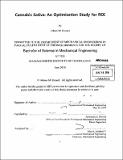Cannabis sativa : an optimization study for ROI
Author(s)
Esmail, Adnan M
DownloadFull printable version (2.744Mb)
Other Contributors
Massachusetts Institute of Technology. Dept. of Mechanical Engineering.
Advisor
Alexander H. Slocum.
Terms of use
Metadata
Show full item recordAbstract
Despite hemp's multifarious uses in over 30 countries ranging from the manufacture of paper to specialty textiles, construction, animal feed, and fuel, its acceptance in the US has been shunned because of its association with marijuana, as a drug. While hemp and marijuana are varieties of Cannabis sativa, their similarity ends there. In reality, the growth of industrial hemp adjacent to marijuana results in cross-pollination that radically reduces potency of marijuana. Although restricted in the United States, industrial hemp farming is growing rapidly in many other countries, including Canada, France and China. Within many of these countries, hemp is grown in different ways and under different conditions to optimize cultivation of particular components of the plant, for either agro-practices or industrial and consumer demands. This study substantiates great economic prospects for cultivars, processors, and industrial partners in the legalization of industrial hemp farming. Hemp has also consistently demonstrated a versatility to grow and adapt to many soil, climatic and environmental conditions. Additionally, hemp improves the land by ridding it of weeds and insects, helping prepare it for rotation crops. Hemp's various components are capable of contributing to different industries with yields that are on par with competing crops like cotton, corn, and soybean, making it a financially attractive rotation crop with many auxiliary benefits. This study recommends hemp be planted as a rotation crop in approximately 25 plants/m 2 to optimize yield of both grain and straw in roughly 5 months. Given the potential for hemp to be the most economically viable agro-industry, with incredible ROI and close to effortless farming and cultivation on even the most challenging terrains, it is high time to legalize the production and farming of this non-psychotic plant for the many reasons contained in this report.
Description
Thesis (S.B.)--Massachusetts Institute of Technology, Dept. of Mechanical Engineering, 2010. Cataloged from PDF version of thesis. Includes bibliographical references (p. 25-29).
Date issued
2010Department
Massachusetts Institute of Technology. Department of Mechanical EngineeringPublisher
Massachusetts Institute of Technology
Keywords
Mechanical Engineering.